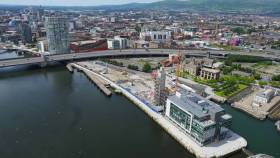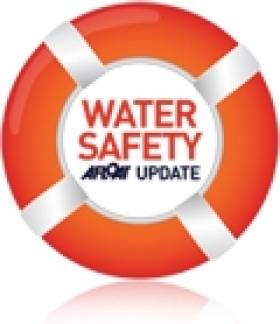Displaying items by tag: UTV
Broadcaster UTV to Relocate to Belfast's City Quays
#belfastlough - Belfast Harbour Commissioners has announced that ITV Broadcasting, owners of UTV are the latest tenant for its new £250 million City Quays 2 office development.
City Quays 2 is a new office led development of 20 acres on Belfast's waterfront. UTV is to relocate from its previous home at Havelock House which has been the local broadcasters base since its launch in Northern Ireland in 1959.
Belfast firm McLaughlin & Harvey has been appointed to fit-out the 11,400 sq ft space and create a modern broadcasting centre complete with HD studio, editing technology and office space for all of UTV’s staff. In addition to Grade ‘A’ office space, City Quays 2 will also include a four-star hotel operated by AC Marriott and a 900-space multi-storey car park.
UTV, which is taking the top floor of City Quays 2, is expected to begin broadcasting from its new studios in the summer of 2018.
Welcoming the move, Graeme Johnston, Belfast Harbour’s Property Director, said: “To confirm a household name such as ITV as the first tenant for City Quays 2 is excellent news and a great reflection on the flexibility of the office space available.”
“Other cities such as Manchester have benefitted from the creation of media quarters such as MediaCityUK and there is the potential to replicate that success here. NBC Universal is already based in City Quays 1, the Belfast Telegraph is located nearby in Clarendon Dock and both the Belfast Harbour Film Studios and Titanic Studios are within easy reach.”
“City Quays 2 has been one of the largest speculative office developments in Northern Ireland in recent years and could ultimately accommodate 1,000 workers.”
Speaking earlier in the year Terry Brennan, Head of News and Programming at UTV said: “We are delighted to have secured the entire eighth floor of this prestigious new building which is in a prime location in central Belfast for our new UTV headquarters. We can see how beneficial this location will be, in terms of the surrounding amenities and transport links for our modern news operation.
“This is also a significant milestone in UTV’s history and represents a multi-million pound investment by ITV since it acquired UTV just over a year ago. We aim to be operational at the new site by the middle of next year, when the detailed technical work will be complete to fit out the new HD studios, edit suites, corporate offices and news, administration, finance and sales areas for our staff.”
NI Lifeguards To Feature In New TV Series
#WaterSafety - RNLI lifeguards in Northern Ireland are to feature on a new television series on UTV.
The Magazine starts on Sunday 7 April at 7.30pm with host Sarah Travers in her home town of Portstewart to introduce viewers to some of her favourite people, places and topics.
As part of the first programme, TV presenter Emma-Rosa Dias will find out what it takes to be a lifeguard with the RNLI when she visits the charity’s area support centre in Ballymoney - before being put through her paces by RNLI lifeguard supervisor Tim Doran to see if she is ready for the challenge.
After a test in the swimming pool, Dias experiences a slice of the real thing when she pays a visit to Portrush East Strand on the Causeway Coast, one of the five beaches in Northern Ireland which begins its Easter season on Good Friday tomorrow 29 March.
As previously reported on Afloat.ie, this lifeguard cover will run throughout Easter week until Sunday 7 April.
Filming took place on Monday afternoon and despite the unseasonal weather, the charity’s highly trained lifeguards took the opportunity to demonstrate that they will be ready to assist the visitors who will brave the elements and take a trip to the seaside over the Easter break.
Speaking following the afternoon’s shoot, Tim Doran said filming with UTV was a great way to show how highly trained RNLI lifeguards are.
"Our lifeguards spot potential dangers before they develop, and are on hand to give appropriate safety advice and respond immediately if anyone gets into difficulty," he said. "Because our lifeguards work closely alongside our volunteer lifeboat crews, it means the RNLI offers beach-goers and water-users a seamless rescue service from beach to open sea."
While Easter is often the time when people are getting back in the water after the winter, and while it’s good to see people enjoying the beaches, the RNLI is encouraging visitors to make sure they have the right kit to keep warm.
"It’s much colder now then it was this time last year," Doran added, "and our lifeguards will be wrapping up and we’d encourage everyone else to do the same. So, if you are heading into the sea, make sure you’re wearing a good wetsuit or drysuit, go with other people and keep an eye on each other.
"Keeping warm in cold weather can take a lot of energy, so fatigue can be an issue, plus watch out for the wind chill factor – even a slight breeze can have a dramatic effect on how cold it feels."
Meanwhile, to find out how Emma-Rosa Dias gets on, tune into UTV at 7.30pm on Sunday 7 April.
New TV Documentary: 'Smugglers'
The documentary also reveals the case of a 62-year-old retired taxi driver from Birmingham caught with 5kg of cocaine concealed behind the engine of his car.
































































